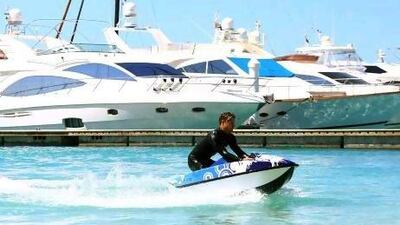A new eco-friendly and silent jet ski is set to go on sale across the UAE as a local manufacturer looks to take advantage of the country's booming tourism market.
JetPad, which is based in the Al Quoz industrial district in Dubai, is launching an electrically powered watercraft that is a cross between a jet ski and a go-kart and reaches speeds of up to 45kph.
The manufacturer hopes initially to sell to hotels as the tourism industry picks up this year.
"The UAE's hoteliers are craving this kind of addition to their watersports offering and we believe that JetPad is the guilt-free answer that can conform to all existing or pending environmental and safety legislation," said Alexander Schellnast, the founder and chairman of JetPad.
The number of foreign tourists visiting the UAE's shores this year is expected to reach almost 9 million, a 9 per cent rise on last year, according to the latest industry report by Business Monitor International, an information and research provider.
Guest numbers in Dubai hotels increased 10 per cent in the first half of last year to 4.6 million. Abu Dhabi enjoyed a record full year, with more than 2.1 million guests checking into hotels in the capital.
JetPad plans to sell 200 watercraft in the first year of operation in the UAE and wider Gulf, before rolling out distribution to other parts of the world.
The JetPad retails at about Dh70,000 (US$19,057) depending on the specifications, and is at the top end of the traditional jet-ski price.
If hotels are unwilling to buy the craft, JetPad will initially offer leasing options. The craft is also available to individuals, who can contact the company on its website.
"We look to attract families, this is what we are looking for, not to be in competition with jet skis. We cannot compete on speed or price," said Mr Schellnast.
The JetPad is three times lighter than a typical jet ski and is powered by a battery that can last up to an hour and can be fully charged within 30 minutes.
"Traditional personal watercraft, despite a poor safety record, remain a hugely popular adrenaline hit among UAE residents and tourists, so we saw a fantastic opportunity to provide an environmentally benign, family-friendly and safer alternative," said Mr Schellnast.
Using a GPS system, the JetPad can be programmed to run only in a certain area of the sea to keep away from swimmers and others using the water.
If the JetPad strays outside the designated area, it automatically slows down and can then be steered into right part of the water.
Thanks to its design, JetPad claims the craft can never be flipped over. It comes in two models, one on which the rider can sit down and another on which the rider is kneeling or lying.
twitter: Follow our breaking business news and retweet to your followers. Follow us

